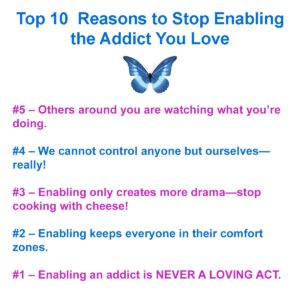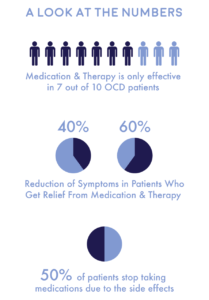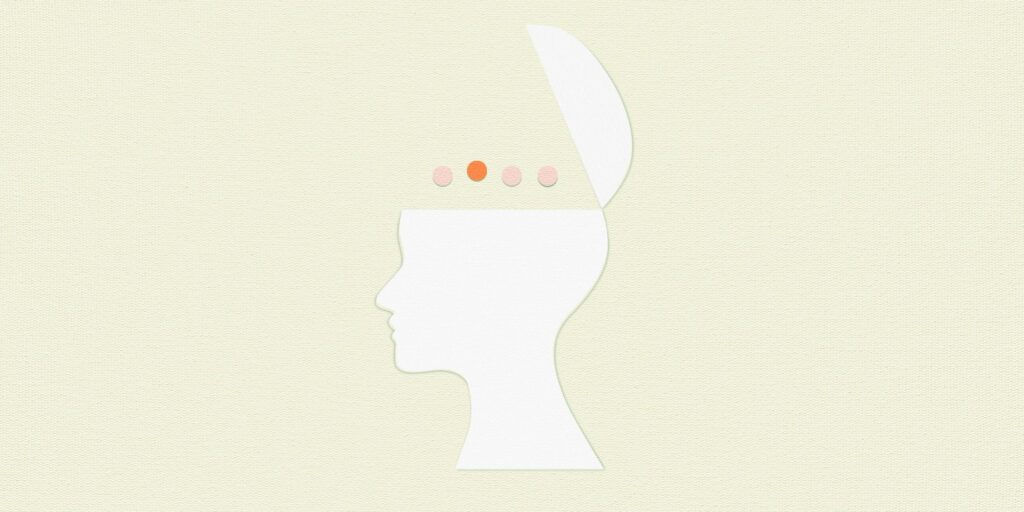It can be difficult to know how to stop enabling OCD. On one hand, you may feel like you are doing what is necessary to help your loved one manage their disorder. However, on the other hand, you may be inadvertently reinforcing OCD behaviors and making it more difficult for them to overcome their condition. In this article, we will discuss the signs of enabling OCD, why it is important to stop, and how you can go about initiating that conversation with your loved one.
Contents
Enabling OCD Means

To enable OCD refers to any behaviors, actions, or words that reinforce OCD symptoms or rituals. When you enable OCD, you are inadvertently supporting the disorder and making it harder for your loved one to recover.
Why People Would Enable OCD
There are a few reasons why people may enable OCD in their loved ones. For instance, they:
- Want to avoid conflict. It can be difficult to confront someone about their disorder, especially if you do not fully understand it yourself.
- Want to help. Many people mistakenly believe that by accommodating their loved one’s OCD, they are helping them manage the condition.
- Are afraid. It is common to feel like you are walking on eggshells around someone with OCD. You may be afraid of triggering their symptoms or making them angry.
Signs of Enabling OCD
There are a few key signs that you may be enabling OCD in your loved one. If you find yourself frequently doing any of the following, it may be time to reevaluate your actions.
- You make accommodations for your loved one’s OCD symptoms. For example, you always drive separately so as not to trigger their contamination fears.
- You do not challenge your loved one’s beliefs about their OCD. For example, you agree that something bad will happen if they do not complete their rituals.
- You avoid talking about your loved one’s OCD. For example, you pretend like everything is normal even though you know they are struggling.
- You participate in your loved one’s OCD rituals. For example, you help them wash their hands or check the locks on the doors.
Why You Should Stop It

There are a few reasons why it is important to stop enabling OCD in your loved one.
- First and foremost, it is not helpful to their recovery. It can hinder progress by reinforcing the disorder.
- Additionally, it can be emotionally draining for you to constantly accommodate their OCD symptoms.
- And finally, enabling OCD can put a strain on your relationship.
Making Your Loved One Understand
If you want to stop enabling OCD in your loved ones, the first step is to have a conversation with them about it. This can be a difficult conversation to initiate, but it is important, to be honest, and direct.
How To Initiate The Conversation
Now that you know what to expect, it’s time to initiate the conversation. This is probably the most difficult part, but there are a few things you can do to make it easier.
- First, choose a time when your loved one is calm and relaxed. You don’t want to try to have this conversation when they’re in the middle of an OCD episode.
- Second, be direct and honest. Tell your loved one that you’re concerned about their OCD and that you want to help them stop enabling it. Here are a few tips:
- Be clear about your reasons for wanting to stop.
- Explain how their OCD symptoms have been affecting you.
- Be prepared to answer any questions they may have.
- Do not be afraid to set boundaries.
- Third, be prepared to listen. This isn’t a time for you to lecture your loved one. Instead, it’s a time for you to listen to their concerns and fears. Only by understanding where they’re coming from will you be able to help them.
Do’s And Don’t
Now that you’ve had the initial conversation, it’s time to start taking action. There are a few things you should do and a few things you should avoid.
DO
- Encourage your loved one to seek professional help. This is the most important thing you can do. OCD is a serious mental illness, and it requires professional treatment.
- Offer to go with your loved one to their appointments. This will show them that you’re supportive and that you want to help them through this.
- Encourage your loved one to participate in OCD treatment. This may include exposure therapy, which is a proven treatment for OCD.
- Educate yourself about OCD. The more you know about the condition, the better equipped you’ll be to help your loved one.
- Be patient. Recovery from OCD takes time, and there will be setbacks along the way. But if you’re patient and supportive, your loved one will eventually get better.
DON’T
- Don’t try to “fix” your loved one’s OCD. This is not something you can fix on your own. Only professional treatment can help your loved one overcome their OCD.
- Never enable your loved one’s OCD. This includes things like providing reassurance, participating in rituals, or avoiding trigger situations. Enabling only makes OCD worse.
- Don’t give up on your loved one. Recovery from OCD is possible, but it takes time and effort. If you give up, your loved one will have no one to turn to.
Decreasing Participation In OCD Rituals
One way to stop enabling OCD is to decrease your participation in rituals. If you find yourself participating in rituals, try to do so less frequently. This may be difficult at first, but it is important to stick with it.
Tips to Stop Reinforcing OCD Behaviors
One of the most important things you can do is to stop reinforcing OCD behaviors. This includes things like providing reassurance, participating in rituals, or avoiding trigger situations.
- Providing reassurance is probably the most common form of reinforcement. For example, if your loved one is worried about getting sick, you might say something like, “Don’t worry, you’re not going to get sick.” But this only reinforces their fear and makes it more likely that they’ll continue to have OCD episodes.
- Similarly, participating in rituals is another form of reinforcement. For example, if your loved one has a fear of contamination, they may ask you to wash their hands for them. But if you do this, you’re only reinforcing their fear and making it more likely that they’ll continue to have OCD episodes.
- Finally, avoiding trigger situations is also a form of reinforcement. For example, if your loved one is afraid of dogs, they may ask you to avoid all situations where there might be dogs. But this only reinforces their fear and makes it more likely that they’ll continue to have OCD episodes.
NOTE: The best thing you can do is to help your loved one exposed to their fears. This may seem counterintuitive, but it’s the best way to help them overcome their OCD. Read about ERP in the coming section!
Other Things To Keep In Mind
There are a few other things you can do to stop reinforcing OCD behaviors.
- Try not to show emotion. It is especially true when your loved one is engaging in OCD behaviors. This includes both negative and positive emotions. Showing any type of emotion can reinforce the behavior because it provides attention, which is what the person with OCD is seeking.
- Don’t argue with the person with OCD. Arguing will likely only make the person more defensive and less likely to want to change their behaviors. Moreover, it can escalate the situation and make the OCD behaviors worse.
- Try to keep a sense of humor. This doesn’t mean that you should make fun of the person with OCD or their behaviors. Instead, try to find the humor in situations and use it as a way to diffuse tension and defuse the power that OCD has over your loved one’s life.
- Try to avoid talking about the person’s OCD. This includes both avoiding talking about specific obsessions and compulsions as well as general conversation about OCD. The more you talk about it, the more important you are giving it, which will only reinforce the OCD behaviors.
- Focus on the positive. When you are talking to a person with OCD, try to focus on the positive aspects of their life and day. This will help them to see that there is more to life than their OCD.
- Don’t lose your calm despite the odds. The way you react to situations can have a big impact on the person with OCD. If you are calm and collected, it will help the person with OCD to feel more in control and less anxious. However, if you are stressed and react negatively, it will only make the OCD behaviors worse.
Subtle Tactics That May Help
If you find it difficult to directly challenge your loved one’s OCD symptoms, there are a few subtle tactics you can use.
- You can try to redirect your loved one’s attention when they start to engage in OCD behaviors. For example, if they start to wash their hands excessively, you can say something like, “I know you’re feeling anxious right now, but why don’t we go for a walk instead?”
- You can also try to provide reassurance differently. For example, instead of saying, “It’s okay, you’re just being paranoid,” you can say, “I’m here for you, and I’ll support you through this.”
NOTE: These tactics may not always work, but they’re worth a try. If nothing else, they’ll show your loved one that you’re on their side and that you want to help them overcome their OCD.
Predicting Repercussions of Stopping OCD Enabling
Before you take any action, it’s important to predict how your loved one may react. If they’ve been enabled for a long time, they may not be used to being challenged. They may become angry, defensive, or even violent.
It’s also important to predict how you may react. This is a difficult situation, and it’s natural to feel scared or overwhelmed. But try to remember that you’re doing this because you want to help your loved one and that it’s in their best interests. Therefore, it’s important to be prepared for all of these reactions, and equally necessary is to stand your ground.
How Loved One May React
Your loved one may react in a variety of ways when you stop enabling their OCD.
- Your loved one may be angry with you at first, but this is usually because they’re afraid of change. If you can explain to them why you’re doing this and how it will help them, they may eventually come to see things your way.
- Your loved one may also be upset with you at first. This is usually because they’re worried about what will happen if they stop their OCD behaviors. But if you can reassure them that you’ll be there to support them, they may eventually come to see things your way.
- Finally, your loved one may be relieved when you stop enabling their OCD. This is because they’re tired of their OCD behaviors and are ready for change. If you can support them through this process, they may eventually come to see things your way.
How You May Handle It
If your loved one reacts negatively when you stop enabling their OCD, there are a few things you can do to handle the situation.
- First, try to remain calm and avoid getting into an argument.
- Second, it’s also important, to be honest with your loved one and explain why you’re no longer going to enable their OCD. You can say something like, “I love you and I want to help you, but I can’t do that if I keep enabling your OCD.”
- Finally, make it clear that you’re still there for them and offer your support in other ways.
NOTE: It’s important to educate yourself about the disorder and its symptoms. This will help you better understand what your loved one is going through and why their behaviors may seem strange to you.
Seeking Treatment For Loved One
People with OCD often benefit from professional help, such as therapy or medication. If your loved one is resistant to getting help, try to find out why and see if there are ways you can be supportive. There are a variety of effective treatments available, and the sooner they start, the better.
Therapies That Can Help

There are a few different types of therapy that can be helpful for OCD.
- Cognitive-behavioral therapy (CBT) is one of the most effective treatments for OCD. It focuses on changing the way people think about and respond to their obsessions and compulsions. Thus, it can help people with OCD learn to control their symptoms.
- Exposure and response prevention (ERP) is a type of therapy that involves exposing oneself to their fears in a controlled setting and then learning how to resist the urge to perform rituals. This can help them to overcome their fear and eventually stop having OCD episodes.
- Medication can also be helpful for some people with OCD. Commonly prescribed medications include selective serotonin reuptake inhibitors (SSRIs), which are a type of antidepressant. However, it’s important to note that medication should be used in conjunction with therapy, not as a replacement.
If your loved one is willing to talk about their OCD and why they’re struggling, it can be helpful to encourage them to seek treatment.
Self-help Tips That May Work
There are a few things you can suggest to loved ones to help manage their OCD symptoms.
- Avoid avoidance.
- Build a support network.
- Use positive reinforcement.
- Practice relaxation techniques.
- Challenge your negative thoughts.
Self-help Tools That Prove Handy
There are a few different self-help tools that can help manage OCD symptoms.
- Thought Record. This is a way of challenging and changing negative thoughts.
- Tracking System. Tracking systems can be used to track progress and set goals.
NOTE: There are many resources available that can help. You can talk to your loved one’s therapist (probably it’s the best option), read books or articles about exposure therapy, or even find online courses.
Conclusion
If you are enabling OCD in your loved one, it is important to stop. There are a few reasons why this is important, and there are a few things you can do to make the transition easier. Seek treatment and use self-help tools to help your loved one recover.
If you or someone you know is struggling with OCD, there are a variety of resources and treatments available. With the right help, it is possible to manage OCD symptoms and live a happy, healthy life.
If you are looking for affordable Online OCD Counseling MantraCare can help: Book a trial OCD therapy session


